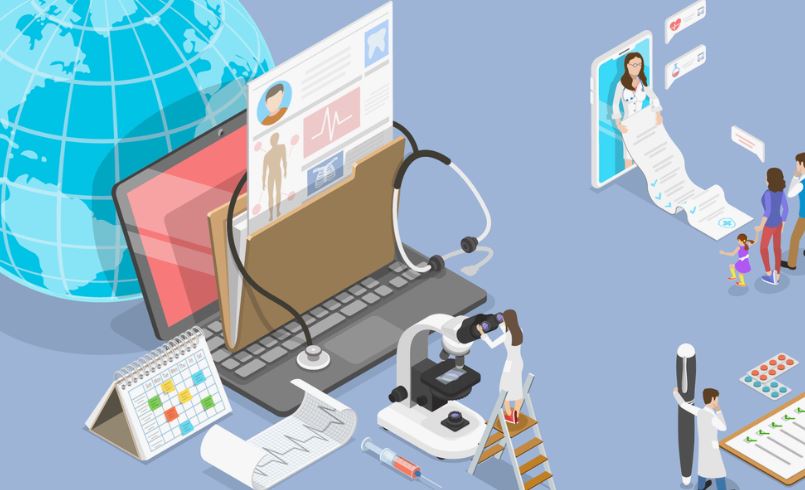EHR and Practice Management Software: The majority of healthcare companies digitize their data and procedures using software. The patient experience can be improved and a practice’s operational efficiency raised with the appropriate tech stack. It can be difficult to determine which tools are best for your particular practice, though. Electronic health record (EHR) software and medical practice management software (PMS) are two of the most significant systems in use today. When used in tandem, these technologies simplify routine administrative duties, allowing you to enhance patient care while adhering to data protection regulations.
What is Practice Management Software?
In short, the goal of practice management software is to facilitate healthcare providers’ office and administrative tasks. Your office workers will receive assistance with all the daily duties required to maintain an effective healthcare office when you use this kind of equipment. The majority of the functionality of practice management software are geared around the scheduling and medical billing requirements of a doctor’s office, even though it does handle certain patient information.
What is EHR?
Instead of using paper charts, electronic health records (EHRs), also known as electronic medical records (EMRs), are designed to digitally record and retain patient medical information. Important patient health data is kept in an electronic format for medical professionals to easily access from anywhere, better organize, and report on. Actually, one of the primary goals of an EHR is to enable several doctors from various practices to access a patient’s medical records whenever they choose. Medical facilities, including imaging centers, pharmacies, urgent care centers, emergency rooms, specialists, and nurses at schools and workplaces, may request access to a patient’s electronic health record.
Also Read:
- Managing Accounts Receivable
- Billing Solutions for (ASC) Ambulatory Surgical Centers
- Expert Solutions For Behavioral Health Billing
Difference between practice management software and EHR:
Practice management software is mostly focused on the administrative aspects of managing a medical practice, whereas electronic health records (EHR) concentrate on patient data. The two systems are crucial to the functioning of any medical facility, while having differing functionalities. Lack of either one compromises operations and lowers the standard of care you provide. Fortunately, practice management (PM) systems and EMRs can be connected. Interoperability is facilitated by an integrated system, which makes it possible for the administrative and clinical aspects of the practice to operate together harmoniously and facilitate smooth data interchange. Here are some key factors to take into account when contrasting these two medical software programs.
Automation:
Automation is a component of practice management software and EHRs alike. Practice management software streamlines repetitive chores like appointment scheduling and task scheduling. After the initial visit, you can keep and utilize patient data, such as names, demographics, insurance coverage, contact details, etc. More clinically oriented automated features in EHRs assist doctors in predicting and identifying health patterns to make decisions about allergies, diagnosis, and treatment regimens.
Incentivization:
In contrast to practice management systems, the government frequently offers incentives for EHR adoption in an effort to raise the standard of treatment. Integrating EHR technologies into their operations may result in significant financial benefits for healthcare providers. These incentives highlight the operational and financial benefits of implementing EHRs and can significantly improve a facility’s financial standing. Furthermore, the variety of healthcare occupations that employ these systems illustrates their adaptability and possible financial returns on investment.
Data Exchange:
The majority of practice management data is organization- and clinic-specific and doesn’t need to be shared with outside parties. EHR, on the other hand, facilitates the safe interchange of data between medical professionals, personnel, patients, and other organizations. The results of treatment and decision-making are enhanced by this partnership.
Main Users:
Office managers and front desk employees are the main users of practice management software. Medical personnel, including nurses, doctors, and dentists, handle EHRs the most. Both kinds of software, albeit from different angles, contribute to the practice’s increased efficiency. Practice management software allows clinicians who don’t require advanced medical functions to simplify their workflows without the additional electronic modules and associated expenditures of a comprehensive EHR system.
Communication with patients:
PMS and EMR both make it easier for patients to communicate. Through a secure patient portal, patients can view all of their medical records at any time. Along with receiving automatic appointment and screening reminders, patients can access their recent visits, prescriptions, and other information.
Conclusion
Medical practice management software and electronic health records (EHR) share certain similarities. In case you’re curious about practice management software, the primary differentiation lies in the fact that an EHR’s basis is patient file documentation and storage, whereas practice management mostly concentrates on the business or administrative aspects of things. You should give practice management software serious consideration if you struggle to organize your schedule or keep track of patient bills. If your objective is to improve care while removing errors and labor-intensive tasks related to keeping paper medical records, an EHR ought to be able to help. You may decide to use both, depending on your goals and the size of your institution.









